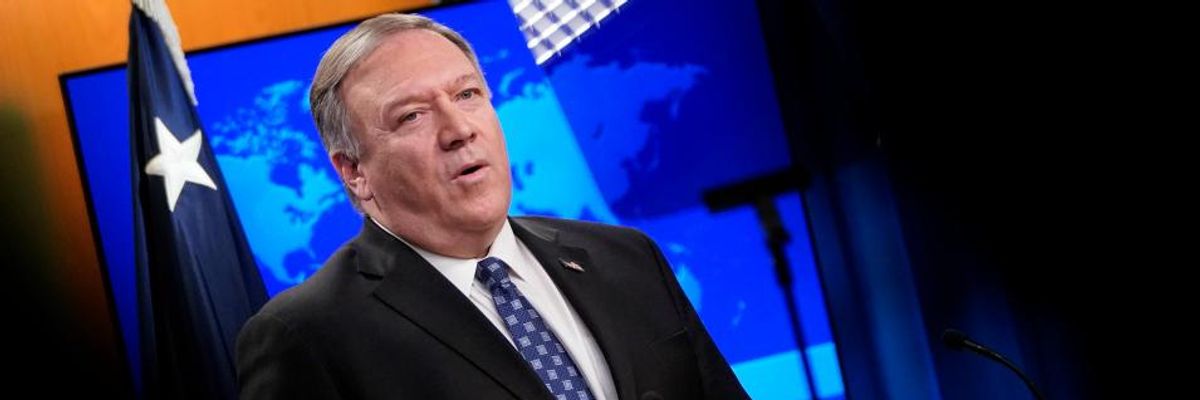After U.S. Secretary of State Mike Pompeo called Iranian Foreign Minister Javad Zarif a "propagandist of the first order" during a Tuesday morning press conference, outspoken anti-war activist Medea Benjamin was among the first to retort: "takes one to know one."
Benjamin wasn't alone in finding it hard to take Pompeo's comment seriously:
"Pompeo is such a gross propagandist," Benjamin tweeted as the press conference continued, "it's hard to listen to him."
Pompeo overtly lied on FOX News over the weekend when he falsely claimed that Trump did not say the U.S. would hit cultural sites in Iran despite a tweet in which Trump made precisely that threat.
It was confirmed Tuesday that the U.S. has blocked Zarif from receiving a visa in order to participate at the United Nations in New York, a move that was widely condemned as both a barrier to peace and a violation of an international treaty.
For his part, Zarif responded to the move by saying it was clear the Trump administration is afraid that someone will go to the U.N. "and tell the truth."
While progressives and leaders from around the world have condemned Trump for his actions--with warnings that War World III could arrive as a result--Pompeo on Sunday blanketed the morning news shows to say he was proud of the successful assassination plot again Soleimani.
"We took a bad guy off the battlefield. We made the right decision," Pompeo told CNN on Sunday. "There is less risk today to American forces in the region as a result of that attack."
Politico reporting on Tuesday detailed how Pompeo--as opposed to top brass at the Pentagon--has been the one to take the lead in defending Trump's controversial military action. According to the reporting:
Secretary of State Mike Pompeo has seized the spotlight amid the escalating U.S. confrontation with Iran. As he's done so, he's come across to some observers as an unofficial secretary of defense, overshadowing the actual defense secretary.
Pompeo's omnipresence illustrates the extraordinary influence he wields in Trump's inner circle three years into the Republican president's tenure.
During Pompeo's morning press conference, the so-called "shadow secretary of defense" continued to defend Trump's decision to order last week's assassination of Iranian Maj. Gen. Qasem Soleimani despite legal experts from around the world who have denounced the attack as illegal under both domestic and international law.
Pompeo's remarks were likely less odd for those who have long understood the secretary is among the most hawkish members of the Trump administration.
Meanwhile, writing for Just Security on Tuesday, Anthony Dworkin, a senior policy fellow for the European Council on Foreign Relations, said the killing of Soleimani by the U.S. marks a "novel" and "dangerous" shift in the country's assassination program.
Trump's decision to target Soleimani, Dworkin wrote, "brings the signature technique of the so-called 'war on terror'--the targeted killing of individuals outside any wider conventional military engagement--into the context of inter-state relations." The repercussions could be severe.
"By targeting a most senior official of another state outside wartime, Trump has taken a step that recent U.S. administrations had shied away from," Dworkin continued, including both the Bush and Obama administrations that respectively built and expanded the American drone killing program.
Karen J. Greenberg, director of the Center on National Security at Fordham University School of Law, largely echoed Dworkin's concerns in a New York Timesop-ed published Monday.
"The United States and Iran are now in a state of war by another name," wrote Greenberg. "The belief that authorities aimed at nonstate actors would not eventually creep into activity against state actors has proved hollow. The expectation that backlash could be limited by decree has shown itself to be wishful thinking. And the trust that good men would always be in office was all-too shortsighted."
The killing of Someilani, she warned, has put the U.S. in new and perilous waters.
The concern now, concluded Dworkin, is that Trump has set a new and "significant precedent in loosening restraints on military action in a way that could prove highly escalatory" if state actors are treated the same way that non-state terrorists have been treated over recent decades.
